反意疑问句
反义疑问句 英语

反义疑问句英语【30条】反义疑问句(tag question)通常由一个陈述句和一个由助动词、主语和否定词构成的短语组成,用于征求听者的同意或确认。
反义疑问句的形式根据陈述句的情态动词、时态和语态的不同而有所变化。
下面是一些例子:1.You can come with me, can't you?(你和我一起去,可以吧?)2.She's not coming, is she?(她不来了,对吧?)3.He hasn't finished yet, has he?(他还没完成,对吗?)4.They were at the party, weren't they?(他们去了派对,是吧?)5.You wouldn't mind helping, would you?(你不介意帮忙,是吗?)6.It's too hot to go out, isn't it?(出去太热了,不是吗?)7.He's a good singer, isn't he?(他唱得很好,对吧?)8.They don't like spicy food, do they?(他们不喜欢辣的食物,对吗?)9.She must be tired, isn't she?(她肯定累了,是吗?)10.You won't forget, will you?(你不会忘,对吧?)11.You don't like ice cream, do you?12.She hasn't finished the project yet, has she?13.He won't be joining us for dinner, will he?14.They don't live in the city, do they?15.You didn't forget to bring your passport, did you?16.He can swim, can't he?17.She isn't coming to the party, is she?18.They haven't seen the movie, have they?19.You won't be late for the meeting, will you?20.He didn't eat all the cake, did he?21.She doesn't speak Spanish, does she?22.They haven't traveled to Europe, have they?23.You haven't finished your homework, have you?24.He won't forget to bring the book, will he?25.She doesn't like coffee, does she?26.They haven't finished their work, have they?27.You won't be leaving early, will you?28.He didn't lose the game, did he?29.She won't be staying for the weekend, will she?30.They don't prefer tea over coffee, do they?。
反义疑问句

陈述部分的主语是指示代词this或that时,反 意疑问句的主语用it,当陈述部分的主语是 指示代词these或those时,其反意疑问句 的主语用they。例如: This is a plane, isn't it? 这是一架飞机,是吗? These are grapes,aren't they? 这些是葡萄, 是吗?
19. 陈述部分是有and, or, for, but 等引起的 并列结构时,疑问部分与邻近分句保持一 致。 We must study hard, or we shall fail, shan’t we?
20. 陈述部分用neither…nor, not only…but also,等连接主语时,疑问部分用复数代词。 Neither you nor I can do it, can we? Not only she but also I passed the exam, didn’t we?
10.当陈述部分所含的否定词是通过加前缀或 后缀构成的,其后的反意疑问句依然用否 定结构。例如: It is unfair, isn't it? 这不公平,是吧?
11.含有否定含义的词在陈述部分作动词的宾 语时,其反意疑问句用肯定结构,也可以 用否定结构。例如:You got nothing from him, did you? 你从他那儿什么也没得到, 是吗?
21.陈述部分的主语是each of...结构时,附 加疑问句在强调整体时用they,当作个别 时用he。
22. 陈述部分有would rather +v.,疑问部分 多用 wouldn't +主语。 He would rather read it ten times than recite it, wouldn't he?
反义疑问句例句20个
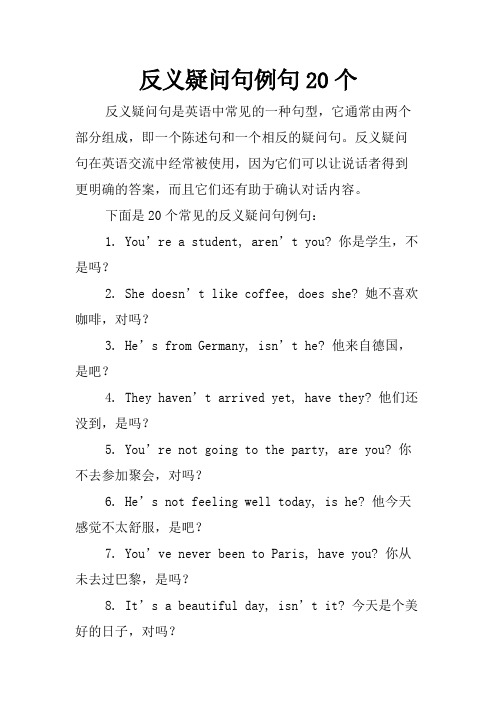
反义疑问句例句20个反义疑问句是英语中常见的一种句型,它通常由两个部分组成,即一个陈述句和一个相反的疑问句。
反义疑问句在英语交流中经常被使用,因为它们可以让说话者得到更明确的答案,而且它们还有助于确认对话内容。
下面是20个常见的反义疑问句例句:1. You’re a student, aren’t you? 你是学生,不是吗?2. She doesn’t like coffee, does she? 她不喜欢咖啡,对吗?3. He’s from Germany, isn’t he? 他来自德国,是吧?4. They haven’t arrived yet, have they? 他们还没到,是吗?5. You’re not going to the party, are you? 你不去参加聚会,对吗?6. He’s not feeling well today, is he? 他今天感觉不太舒服,是吧?7. You’ve never been to Paris, have you? 你从未去过巴黎,是吗?8. It’s a beautiful day, isn’t it? 今天是个美好的日子,对吗?9. He can’t swim, can he? 他不会游泳,对吗?10. She doesn’t like pizza, does she? 她不喜欢披萨,对吗?11. You’re not afraid of heights, are you? 你不怕高,对吗?12. They won’t be able to attend the meeting, will they? 他们不能参加会议,对吗?13. They’re leaving tomorrow, aren’t they? 他们明天要走了,对吗?14. He’s never been skiing, has he? 他从未滑过雪,对吗?15. She’s not going to the concert, is she? 她不去音乐会,对吗?16. You’re not worried about the exam, are you? 你不担心考试吧,对吗?17. He didn’t eat breakfast this morning, did he? 他今天早上没吃早餐,对吗?18. They’r e not going to the beach, are they? 他们不去海边,对吗?19. You’ve already seen the movie, haven’t you? 你已经看过这部电影了,对吗?20. He’s not coming to the party, is he? 他不来参加聚会,对吗?在使用反义疑问句时,需要注意的是,它们并不总是表示对话者的不确定或疑虑。
反义疑问句的14种常考特殊用法
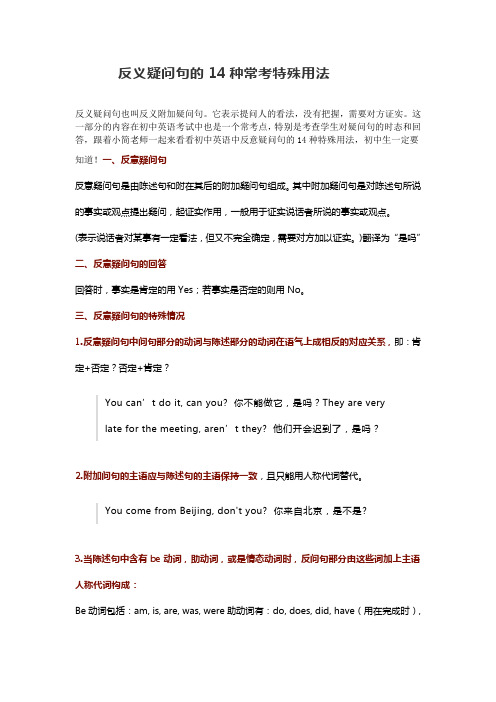
反义疑问句的14种常考特殊用法反义疑问句也叫反义附加疑问句。
它表示提问人的看法,没有把握,需要对方证实。
这一部分的内容在初中英语考试中也是一个常考点,特别是考查学生对疑问句的时态和回答,跟着小简老师一起来看看初中英语中反意疑问句的14种特殊用法,初中生一定要知道!一、反意疑问句反意疑问句是由陈述句和附在其后的附加疑问句组成。
其中附加疑问句是对陈述句所说的事实或观点提出疑问,起证实作用,一般用于证实说话者所说的事实或观点。
(表示说话者对某事有一定看法,但又不完全确定,需要对方加以证实。
)翻译为“是吗”二、反意疑问句的回答回答时,事实是肯定的用Yes;若事实是否定的则用No。
三、反意疑问句的特殊情况1.反意疑问句中问句部分的动词与陈述部分的动词在语气上成相反的对应关系,即:肯定+否定?否定+肯定?You can’t do it, can you? 你不能做它,是吗?They are verylate for the meeting, aren’t they? 他们开会迟到了,是吗?2.附加问句的主语应与陈述句的主语保持一致,且只能用人称代词替代。
You come from Beijing, don't you? 你来自北京,是不是?3.当陈述句中含有be动词,助动词,或是情态动词时,反问句部分由这些词加上主语人称代词构成:Be动词包括:am, is, are, was, were助动词有:do, does, did, have(用在完成时),has(用在完成时)等情态动词有:can, could, may, might, must, will, would, shall, shouldHe will go home, won’t he? 他要回家了,是吗?She doesn’tlike to eat popcorn, does she? 她不喜欢吃爆米花,是吗?4.have的不同用法,反义疑问句用不同的动词(1)have 表“有”时,反义疑问句谓语动词用have/do都行He has a new car, doesn’t/hasn’t he?(2)have表“吃,喝,玩,度过,举办”等是,反义疑问句谓语动词用doHe has supper at home every day, doesn’t he?They had agood time in Beijing, didn’t they?(3)have to表“不得不,必须”时,反义疑问句谓语动词用doKite has to help her mother, doesn’t she?(4)had better表“最好”时,反义疑问句谓语动词用hadWe had better go to school at once, hadn't we?(5)have用在完成时中,反义疑问句谓语动词用haveThey have known the matter, haven’t they?5.(1)反意疑问句的陈述部分带有little, few, never, hardly, seldom,nobody, nothing, no one, none, neither等否定意义的词时,问句部分用肯定式。
反义疑问句

conversation n.交谈;谈话hold/have a conversation with 和……谈话Children quickly get bored by adult conversation.aloud adv.大声的;出生地aloud是相对于默读而言,声音不一定很大。
常与read,say等动词连用。
loudly表示有目的的提高音量以便让人听见。
常指声音高且喧闹、不悦耳等patient adj.有耐心的n.病人be patient with/to 对……有耐心be patient of sth忍耐某事Are you patient enough to teach me how to send email?discover v.发现;发觉dis(否定前缀)+cover(覆盖)发现We discover this beach while we were sailing around the island.secret n.秘密;秘诀adj.秘密的;保密的通常用作单数名词,其前加定冠词the。
keep a secret 保密the secret to ……的秘诀in secret 秘密地,暗地里let out a secret泄露机密tell sb a secret 告诉某人一个秘密Your secret is safe with me.look up(再词典、参考书中或通过电脑)查阅;抬头看We I called him,he looked up from his paper he was writing.I look up the word in several dictionaries.repeat v.重复;重做repeat本身已包含“重、又、再”的含义,故不可与“again”连用。
Please repeat what I’ve just told you.increase v.增加;增长increase by 增加了increase to 增加到Try to increase thenumber of your words.they’ve increased the price by 50﹪.speed n.速度at the speed of 以……的速度with all speed 以全速Extreme care is always needed when flying at high speed.born v.出生adj.天生的be born with 天生具有be born in 出生于Her borther was born with blind.connect v.(使)连接;与……有联系connect with 把……和……连接起来connect to 把……连接到……Connect the speakers to the CD players.knowledge n.知识;学问knowledge是不可数名词,但有时可加不定冠词,意为“对……有某种程度的了解”;knowledge 不能做learn的宾语,只能说get some knowledge。
反义疑问句

(4) 当must + have done表示对过去的 情况进行推测(一般句中有明确的过去时间 状语),问句要根据陈述部分谓语的情况用 “didn„t+主语”或“wasn‟t/weren„t+主 语” She must have read the novel last week, didn't she? 她上星期一定读了这本小说,是吗? Jim must have been absent that day, wasn‟t he?
they
something时, 附加疑问句中主语用it 不用
(3)this, that, 或those, these时,附加疑问 句中主语用it 或 they.
(4)everyone,everybody, someone,somebody等,附加 疑问句中主语一般用he/they. (5)不定式,动名词,其他短语,附 加疑问句中主语一般用it。 (6)在there be句型中,附加疑 问句中主语一般用be/情态动词/助 动词+there。
"It isn‟t cheap, is it?” “它不便宜吧?” "Yes, it is.” “不,很便宜。” “No , it isn‟t .” “是的, 不便宜。”
“He doesn‟t love her, does he?” “他不爱她,是吗?” "No, he doesn‟t” “是的,他不爱她。” “Yes, he does." “不, 他爱她。”
The
Disjunctive
Question
反义疑问句(The Disjunctive Question) 即附加疑问句。反义疑问 句可以表示真实的疑问,也可以表示 说话者的某种倾向、强调或反问。反 义疑问句有前后两个部分,若前一部 分为肯定式,后一部分一般用否定式; 若前一部分为否定式,后一部分一般 用肯定式。
反义疑问句知识点

反义疑问句反义疑问句:在陈述句后附加一个简短的疑问句,可以表示疑问,也可以表示说话者的某种倾向,强调或反问。
反义疑问句通常由两个词组成:第一个词是be、情态动词、助动词;若为否定,not用简略形式。
第二个词是人称代词主格(与陈述句主语相同)。
例:……,can't we? 和……,can we?⑴一般情况下:前面陈述句是肯定句,后面反义疑问句部分用否定;即“前肯定后否定,前否定后肯定”。
⑵当陈述句部分有表示否定或部分否定意义的词如little,barely,hardly,rarely,scarcely,seldom,few,no,never,nothing,not等词时,反意疑问句部分要用肯定形式。
You can hardly blame Tom for leaving early, can you?你不能责怪汤姆提前离开,是吗?当陈述句部分中表示否定意义的词为含有im-,in-,dis-,un-等否定前缀或-less等否定后缀的词时,应把陈述句部分视为肯定句,反意疑问句部分要用否定形式。
(有否定意义,但不能算否定词)Tom dislikes the book,doesn't he? 汤姆不喜欢这本书,是吗?⑶陈述句主语不同情况①当陈述句部分的主语是everyone,someone,anyone,no one,everybody,somebody,anybody,nobody等表示人的不定代词时,反意疑问句部分的主语通常用he,但口语多用they;Nobody wants to go here,does he/do they?没有人想去那里,是不是?②当陈述句部分的主语是anything,everything,nothing,something 等表示物的不定代词时,反意疑问句部分的主语常用it.Everying seems all right now,doesn't it?似乎一切顺利,是不是?②当陈述句部分的主语是I 时,反意疑问句部分的主语常用aren't I.若表示征询对方意见时,疑问句部分用do you.I am healthy,aren't I?我很健康,对吗?I don't like this film,do you?我不喜欢这部电影,你呢?④当陈述句部分的主语是不定式(短语)或动名词(短语)时,反意疑问句部分的主语常用it.Learning English well takes a long time,doesn't it?学好英语需要好长时间,是不是?②当陈述部分的主语是指示代词this /that或these /those时,疑问句中的主语分别用it或theyThis is important, isn't it? 此事很重要,是不是?②如果陈述部分是以代词one作主语疑问句的主语,在正式场合用one 非正式场合用you在美国英语中非正式场合下,还可以用heOne cannot be too careful, can one /can you? 越仔细越好,对不对?②陈述部分有neither…nor 或both …and连接两个主语时,疑问句部分的主语常用复数形式。
反意疑问句

20) 当 have 为实意动词时要分两种情况: (1)若表示“所有”,反意疑问句可以用have,也可以 用do: eg: He has a lot of friends here, hasn’t / doesn’t he? 但是若陈述部分用的是have的否定式,反意疑问句用 have 还是用do,取决于陈述部分的动词形式: eg: He hasn’t any money, has he? He doesn’t have any money, does he? (2) 若表示“吃”、“玩”等其它意思,反意疑问句要 用助动词do: eg: He has supper at 5, doesn’t he? eg: He had a good time at the party, didn’t he?
4) 含有ought to 的反意疑问句,陈述部分是肯定的,疑问部 分用shouldn't / oughtn't +主语。 eg: He ought to know what to do, oughtn't he? / shouldn't he? 5) 陈述部分的谓语是used to 时,疑问部分用didn't +主语或 usedn't +主语。 eg: He used to take pictures there, didn't he? / usedn't he? 6) 陈述部分有would rather +v.,疑问部分多用 wouldn't +主 语。 eg: He would rather read it ten times than recite it, wouldn't he?
反义疑问句(最全)
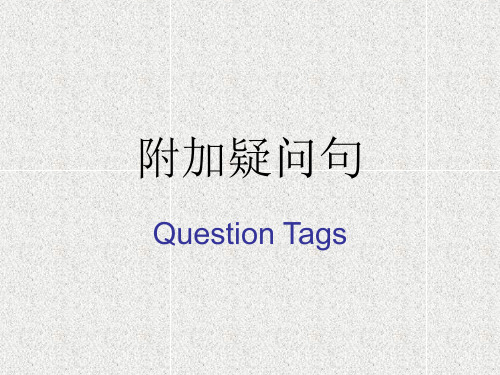
5.陈述部分有would rather +v.,疑问部分多用 wouldn’t +主语。 He would rather read it ten times than recite it, wouldn’t he? 6.陈述部分有you’d like to +v. 疑问部分用wouldn’t + 主语。 You’d like to go with me, wouldn’t you? 7.陈述部分是“there be”结构时,疑问部分用there省 略主语代词。 There is something wrong with your watch, isn't there? There will not be any trouble, will there? Note: 当为“ there used to be…”句型时,反意问句用 didn’t there。
b. 带有定语从句,宾语从句的主从复合句,疑问部分谓 语根据主句的谓语而定 He is not the man who gave us a talk, is he? He said he wanted to visit Japan, didn’t he?
c. 上述部分主句是由谓语think, believe, expect, suppose, imagine等引导的宾语从句,疑问部分与宾语 从句相对应构成bright, is he? We believe she can do it better, can't she? Note: 但此时主语必须是第一人称。如果不是,则不能否定从 句。 He thought she was wrong, didn't he? 而不能说wasn't she?
a 表示肯定推测 (一)句中陈述部分没有表示过去的时间状语,这时疑问 部分中的动词就用现在完成时。 (haven’t / hasn’t + 主语) You must have told her about it, haven’t you?
英语反意疑问句

英语反意疑问句反意疑问句是一种特殊的疑问句,其结构为:“陈述句+反意疑问句的转折连接词+反义疑问句”,用于表示对某一观点的质疑或确认。
下面是关于英语反意疑问句的相关内容。
一、反意疑问句的概述反意疑问句是用于询问或肯定对方对陈述的观点的一种问句。
其结构为“陈述句+反意疑问句的转折连接词+反义疑问句”。
反意疑问句的转折连接词有常用的有"but"、"though"、"yet"、"still"等。
反意疑问句一般用于英语口语中,使得对话更加自然流畅。
二、反意疑问句的用法1. 反面认同:对一个肯定的事实提出质疑。
例如:"You went to the party last night, didn't you?"2. 正面疑问:对一个否定的事实提出确认。
例如:"You don't like coffee, do you?"3. 意见确认:对对方的意见进行确认。
例如:"You think it's going to rain today, don't you?"4. 邀请确认:表示邀请的疑问。
例如:"Let's go for a walk, shall we?"三、反意疑问句的语气反意疑问句的语气可以根据情境和语调来调整。
积极的反意疑问句用于表示请求或请求对方的肯定回答,例如:"You'll help me, won't you?" 消极的反意疑问句用于表示期待否定回答或表示对方的斥责,例如:"You didn't do your homework again, didyou?"四、反意疑问句的注意事项1. 反意疑问句通常是在对话中使用,不适用于正式文体。
反意疑问句(精品)
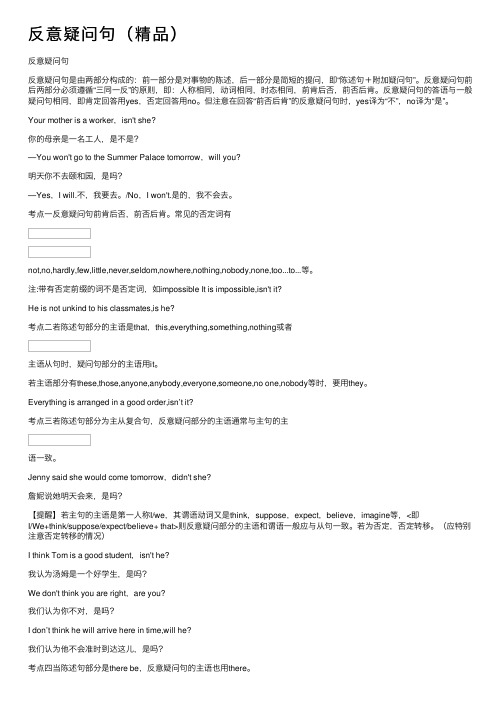
反意疑问句(精品)反意疑问句反意疑问句是由两部分构成的:前⼀部分是对事物的陈述,后⼀部分是简短的提问,即“陈述句+附加疑问句”。
反意疑问句前后两部分必须遵循“三同⼀反”的原则,即:⼈称相同,动词相同,时态相同,前肯后否,前否后肯。
反意疑问句的答语与⼀般疑问句相同,即肯定回答⽤yes,否定回答⽤no。
但注意在回答“前否后肯”的反意疑问句时,yes译为“不”,no译为“是”。
Your mother is a worker,isn't she?你的母亲是⼀名⼯⼈,是不是?—You won't go to the Summer Palace tomorrow,will you?明天你不去颐和园,是吗?—Yes,I will.不,我要去。
/No,I won't.是的,我不会去。
考点⼀反意疑问句前肯后否,前否后肯。
常见的否定词有not,no,hardly,few,little,never,seldom,nowhere,nothing,nobody,none,too...to...等。
注:带有否定前缀的词不是否定词,如impossible It is impossible,isn't it?He is not unkind to his classmates,is he?考点⼆若陈述句部分的主语是that,this,everything,something,nothing或者主语从句时,疑问句部分的主语⽤it。
若主语部分有these,those,anyone,anybody,everyone,someone,no one,nobody等时,要⽤they。
Everything is arranged in a good order,isn’t it?考点三若陈述句部分为主从复合句,反意疑问部分的主语通常与主句的主语⼀致。
Jenny said she would come tomorrow,didn't she?詹妮说她明天会来,是吗?【提醒】若主句的主语是第⼀⼈称I/we,其谓语动词⼜是think,suppose,expect,believe,imagine等,<即I/We+think/suppose/expect/believe+ that>则反意疑问部分的主语和谓语⼀般应与从句⼀致。
反义疑问句(含解析、例句及详尽用法)
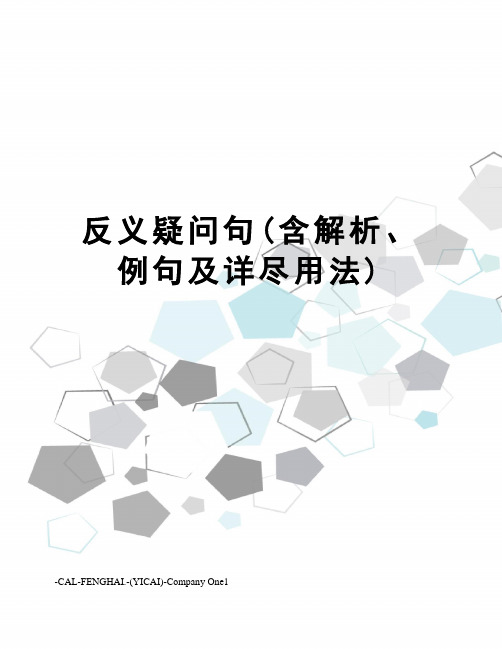
反义疑问句(含解析、例句及详尽用法)-CAL-FENGHAI.-(YICAI)-Company One1反义疑问句一、祈使句的反义疑问句1、肯定祈使句Will you/won’t you2、否定祈使句Will you3、Let的祈使句Let us ...,will you(此处Let us 表示“允许我们...”)Let’s...,shall we (此处Let’s表示“让我们...吧”)Let + 第三人称...,will you二、Must的反义疑问句1、表示“必须” musn’t /needn’tEg. You must go now, needn’t you2、表示“不准”Eg. You musn’t smoke here, must/may you3、表示推测,肯定。
(I’m sure + 从句)Eg. You must be hungry now, aren’t youI’m sure you are hungry now, aren’t youShe must have heard about that, hasn’t sheI’m sure you have heard about that, haven’t youYou must have watched that movie last night, didn’t you(last nigh为具体时间点,所以用一般过去式)三、主语(反义疑问句)+从句主句:I(don’t)think/believe/consider/suppose 或 I’m afraid/sure...后跟从句时,可将从句部分进行反义疑问Eg. I don’t think he will win, will heI think he will win, won’t heShe thinks he will win, doesn’t she(当主句主语不是I时不适用于该用法,此句中的翻译疑问针对的是主句而非从句)四、当句中包含有表示否定意义的副词或不定代词时,反义疑问句用肯定形式Eg. Nothing happened to him, did itIt is unfair, isn’t itHe dislikes watching TV, doesn’t he(该句中含否定意义的是动词而非副词或不定代词,因此不适用于该用法,反义疑问句仍然使用否定形式)五、反义疑问句的回答反义疑问句的回答针对被提问部分的谓语动词,且与回答句前部分的Yes和No 保持一致Eg. A: You haven’t lost the ticket, have youB: D I know it’s hard to get another one at this moment.A. Yes, I haven’tB. No, I haveC. I hope soD. I’m afraid not六、陈述部分的主语与反义疑问句主语保持一致的情况1、OneEg. One can’t be too careful when driving a car, can one/he一个人在开车的时候再怎么小心也不为过。
高中英语反义疑问句(详细)
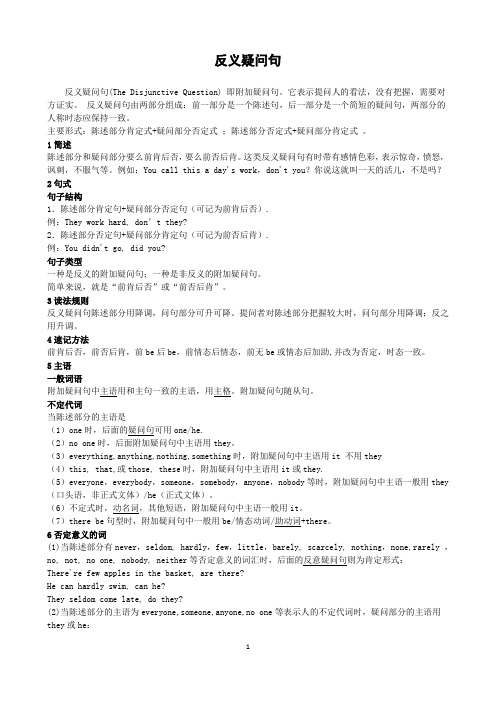
反义疑问句反义疑问句(The Disjunctive Question) 即附加疑问句。
它表示提问人的看法,没有把握,需要对方证实。
反义疑问句由两部分组成:前一部分是一个陈述句,后一部分是一个简短的疑问句,两部分的人称时态应保持一致。
主要形式:陈述部分肯定式+疑问部分否定式;陈述部分否定式+疑问部分肯定式。
1简述陈述部分和疑问部分要么前肯后否,要么前否后肯。
这类反义疑问句有时带有感情色彩,表示惊奇,愤怒,讽刺,不服气等。
例如:You call this a day's work,don't you?你说这就叫一天的活儿,不是吗?2句式句子结构1.陈述部分肯定句+疑问部分否定句(可记为前肯后否).例:They work hard, don’t they?2.陈述部分否定句+疑问部分肯定句(可记为前否后肯).例:You didn't go, did you?句子类型一种是反义的附加疑问句;一种是非反义的附加疑问句。
简单来说,就是“前肯后否”或“前否后肯”。
3读法规则反义疑问句陈述部分用降调,问句部分可升可降。
提问者对陈述部分把握较大时,问句部分用降调;反之用升调。
4速记方法前肯后否,前否后肯,前be后be,前情态后情态,前无be或情态后加助,并改为否定,时态一致。
5主语一般词语附加疑问句中主语用和主句一致的主语,用主格。
附加疑问句随从句。
不定代词当陈述部分的主语是(1)one时,后面的疑问句可用one/he.(2)no one时,后面附加疑问句中主语用they。
(3)everything,anything,nothing,something时,附加疑问句中主语用it 不用they(4)this, that,或those, these时,附加疑问句中主语用it或they.(5)everyone,everybody,someone,somebody,anyone,nobody等时,附加疑问句中主语一般用they (口头语,非正式文体)/he(正式文体)。
反义疑问句
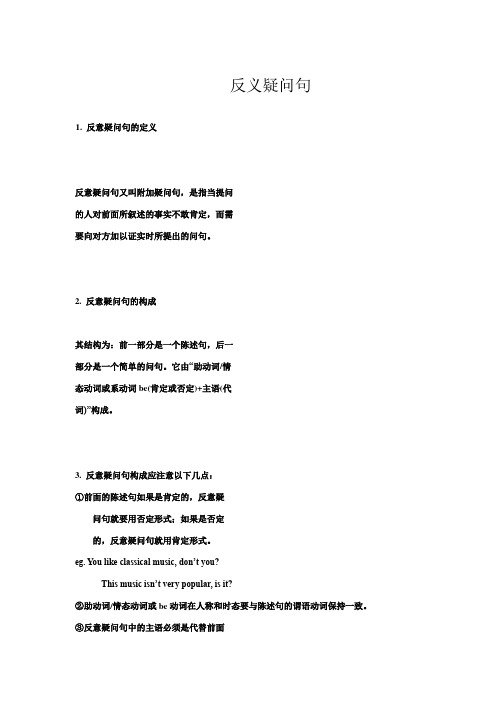
反义疑问句1. 反意疑问句的定义反意疑问句又叫附加疑问句,是指当提问的人对前面所叙述的事实不敢肯定,而需要向对方加以证实时所提出的问句。
2. 反意疑问句的构成其结构为:前一部分是一个陈述句,后一部分是一个简单的问句。
它由“助动词/情态动词或系动词be(肯定或否定)+主语(代词)”构成。
3. 反意疑问句构成应注意以下几点:①前面的陈述句如果是肯定的,反意疑问句就要用否定形式;如果是否定的,反意疑问句就用肯定形式。
eg. You like classical music, don’t you?This music isn’t very popular, is it?②助动词/情态动词或be动词在人称和时态要与陈述句的谓语动词保持一致。
③反意疑问句中的主语必须是代替前面主语的代词。
还要注意:①陈述句部分如果含有否定意义的词(nothing,no,nobody hardly, never,little, few,seldom等),反问句要用肯定式。
He has nothing left, __?They have never been to school, _____?He hasn’t got any apples,_____?He doesn’t have any apples, ____?He has little apples,_______? (仔细思考have/has 在句子中是助动词还是实义动词)答案:1. doeshe 2. have they 3. has he 4. does he 5. does he②当句子为祈使句时,反问句一般用will you。
Drive more slowly, will you?Speak loudly, _____?Don’t smoke, _____?Let us go home, ______?当祈使句为Let’s…结构时,则用shall we。
Let’s go to the cinema, shall we?我们去看电影,好吗?当陈述部分的主语是(1)用one时,用one/he.(2)this, that,或those, these时,用it或they. (3)everything,anything,nothing,something时,用it 不用they(4)everyone,everybody,someone,somebody,anyone,nobody等,用he/they(5)不定式to do ,动名词doing,其他短语,用it。
反义疑问句

特殊的反义疑问句1.Sit down and have a cup of tea ,will you? \ won't you ?Don't be late again, will you ?2.Let's have a rest, shall we? \ shan't we? \ OK?Let us go home now, will you? \won't you?Let meLet him3.What a beautiful girl ,isn't she ?4.I'm quite tall, aren't I?5.Something is wrong with my radio, isn't it?Nothing is serious, is it ?6.Everybody likes Beijing, don't they?Nobody wants to go swimming , does he ? \ do thay ?Neither of them is right, is he ? \ are they ?7.This is my ruler, isn't it ?Those are their books , aren't they ?8.One should do one's duty, shouldn't one?One cannot always do one's duty , can you ?9.What you need is more practice, isn't it ?To learn English well isn't easy ,is it ?Swimming is great fun, isn't it ?10.I wish to go home ,may I ?I wish I were you , may I ?11.He said that it was worth doing ,didn't he ?She said that her father had gone to America , didn't she ?I think he will be back in an hour , won't he ?I don't suppose you are serious , are you ?12.We must study English hard or we can't be good at it , can we ?He is a teacher but his wife is a nurse , isn't she ?13 当must 表示“必须”时,He must work hard next term , mustn't he ?当must 表示“必要”时,They must renew the books , needn't they ?当must 表示“推测”时,She must be very tired , isn't she ?You must have been to Huangshan ,haven't you ?14.You'd better come back early ,hadn't you ? \ shouldn't you ?You'd like to go there , wouldn't you ?You'd rather15.--Tom told me he saw a ghost last night ?-- He did , did he ?-- You mustn't listen to his story .-- Oh , I mustn't , mustn't I ?主谓一致一,谓语动词用单数1.either, neither ,one ,each (of) ,every (of) ,作主语或修饰主语时E.g. Every silver knife ,fork ,spoon has to be counted .2. everybody ,everyone ,everything ,no one ,no body ,anyone等不定代词,what ,whoever 等作主语3.不定式,动名词,从句作主语时谓语动词单数To see is to believe .Singing and dancing are their greatest pleasure .4.国家,机构,书刊,事件名称等作主语:The United Nations was founded in 1945.5.并列主语指同一事物时Ice cream and cake is what she wants after dinner .6.many a + 单数名词(表示许多)Many a student wants to apply for the scholarship .7.mathematics ,measles ,physics ,politics ,news二.谓语动词用复数1.both, few, many, several ,a number of ,the majority of 作主语或修饰主语2.用and 或both...and...连接的两个不同事物The manager and the secretary of the firm are very able man .The editor and publisher of the newspaper is a very able man .3.某些集合名词:few ,people ,the rest ,cattle ,police 等作主语4.正式语中,one of those + 复数名词+ 定从(谓语复数) Jane is one of those persons who always think they are right.the only one of +单数名词+ 定从(谓语单数)三.谓语动词有时单数有时复数1.a good many ,a number of + 复数名词a good deal + U2.family ,army ,class ,crowd ,herd ,public ,group, party ,committee, company ,government ,team等表整体--单数表成员--复数Class 2 is having English class . Class 2 are playing on the sports ground.3.Chinese ,Japanese ,English , French 指语言-- 单数指人民-- 复数4.时间,金钱,距离,体积等作主语---V.单数Twenty dollars is too expensive .表具体的、个别的单位--复数The last two years have been very difficult for us .真题1.In the coming summer holidays,my family ___ going to take a one-week trip to Qingdao.A.isB.areC.wasD.were2.___ pretty your dress is !Where did you get it ?A.HowB.How aC.WhatD.What a3.--There is enough food for the birds ,isn't ____?--No. We need to get some.A.itB.thereC.thatD.this4.--Your monitor id never late for school , is he ?--____.He always comes to school earlier than others .A.Yes ,he is .B.No,he isn'tC.Yes,of courseD.No,sometimes5.--_____ ?--He thinks China is great .A.What does your father think of China ?B.What does your father like in China ?C.Does your father like China ?6.--The film "Hoot"(拯救猫头鹰)is on at the movies .Let's go to see it ,____?--Ok. Let's go .A.will youB.shall weC.won;t weD.don;t you7.Lily is away .She ,with her mother ,____ to Zhalong to see birds .A.has goneB.have goneC.has been8.-- How many teachers are there in your school ?-- About 200. One third of them ___ men teachers.A.haveB.hasC.areD.is9.In our school library there ___a number of books on science and the number of them___growing larger and larger .A.is; areB.are; isC.has ;isD.have ;are10.Nothing is difficult in the world if you put your heart into it ,_____?A.aren't theyB.isn't itC.are theyD.is it。
- 1、下载文档前请自行甄别文档内容的完整性,平台不提供额外的编辑、内容补充、找答案等附加服务。
- 2、"仅部分预览"的文档,不可在线预览部分如存在完整性等问题,可反馈申请退款(可完整预览的文档不适用该条件!)。
- 3、如文档侵犯您的权益,请联系客服反馈,我们会尽快为您处理(人工客服工作时间:9:00-18:30)。
反义疑问句的特殊句型(一)(1)当陈述部分有never,seldom, hardly,few,little,barely, scarcely, nothing,none, rarely, no, not, no one, nobody, neither等否定意义的词汇时,后面的反意疑问句则为肯定形式:●There are few apples in the basket, are there?●He can hardly swim, can he?●They seldom come late, do they?(2)当陈述部分的主语为everyone, someone, anyone, no one, nobody等表示人的不定代词时,疑问部分的主语常用they:●Nobody came to see me while I was out, did they?(3)当陈述部分的主语为everything, something, anything, nothing等表示物的不定代词时,疑问部分的主语用it:●Something is wrong with your watch, isn’t it?(4)当陈述部分含有否定意思的词是unhappy, dislike, unfriendly,等含有否定词缀的派生词,也就是有un, dis-, no-前缀、less-后缀等含有词缀而意思否定的词,当做肯定句处理,疑问部分要用否定形式。
如:●He looks unhappy, doesn’t he? 他看上去不高兴,不是吗?●The girl dislikes history, doesn’t she? 这女孩不喜欢历史,不是吗?有less, fewer等词视为肯定词,疑问部分用否定形式。
如:●There will be less pollution, won't there?(二)表示主语主观意愿的词含有think, believe, suppose, imagine, expect等动词后接宾语从句构成的主从复合句在构成反意疑问句时,视情况不同有两种不同的构成方式。
(即当主句是I think,I believe,I suppose,I imagine,I expect时要反问从句,其余句式均反问主句。
)(1)当主句的主语为第一人称时,其后的简短问句应与从句相一致.例如:I expect our English teacher will be back this weekend, won't she/he?We suppose you have finished the project, haven't you?值得注意的是,当这些动词后接的宾语从句的否定转移到主句时,其仍属否定句,故其后的简短问句应用肯定式,而非否定式。
例如:I don't believe that he can translate this book, can he?We don't imagine the twins have arrived, have they?此类句子的回答同"前否后肯"型反意疑问句一样,如上述后一个句子,若双胞胎已经到了,则回答为"Yes, they have.";若尚未到达,使用"No, they haven't."。
(2)当主句的主语为第二、三人称时,其后的简短问句则应与主句相一致(此时,否定只看主句,与从句无关)。
例如:●Your sister supposes she needs no help, doesn't she?●You thought they could have completed the project, didn't you?●They don't believe she's an engineer, do they?●She doesn't expect that we are coming so soon, does she?(3)陈述部分有had better,或其中的had表示完成时态时,疑问句应用hadn’t等开头:You’d better get up early, hadn’t you?其他情况句中有have时疑问句应用don't等开头, 如have表示“有”的时候,有两种形式:(have 表示有可用do或have来改写)●He has two sisters, doesn’t he? =He has two sisters, hasn’t he?●He doesn't have any sisters, does he?当陈述部分是祈使句时,疑问句要根据语气来表达,分三种情况:1)一般情况下用will you 或won't you。
●Give me a hand, will you?●Leave all the things as they are, won’t you?2)以Let's(听者包括在内)开头的祈使句,前肯后可肯可否,疑问句必须用shall we(shall 只用于第一人称);只有以Let us(听话人不被包括在“us”里面)或Let me开头的祈使句,问句才用will you。
●Let us know the time of your arrival, will you?●Let's try again, shall we?●Let me help you, will you?●Let’s have a look on your book,shall we?3)当陈述句是否定的祈使句时,问句可用will you 或can you 。
●D on’t make much noise, will/can you?There be 句型中,反义疑问部分必须为be 动词+ there●There are some apples in the basket, aren't there?●There isn't any milk left, is there?当陈述部分有情态动词must,问句有4种情况:(1)mustn't表示“禁止,不可,不必”时,附加问句通常要用must.●You mustn't stop your car here, must you? (你不能把车停在这地方,知道吗?)(2)must表示“有必要”时,附加问句通常要用needn't.●They must finish the work today, needn’t they? (他们今天要完成这项工作,是吗?)(3)当must用来表示对现在的情况进行推测时,问句通常要根据must后面的动词采用相应的形式。
●He must be good at English, isn’t he? (他英语一定学得很好,是吗?)●She must be a good English teacher, isn’t she? (她一定是位优秀的英语老师,是吗?)(4)当must have done表示对过去的情况进行推测(一般句中有明确的过去时间状语),问句要根据陈述部分谓语的情况用“didn't+主语”或“wasn't/weren't+主语”;如果强调动作的完成(一般没有明确的过去时间状语),问句要用“haven't/hasn't+主语”。
●She must have read the novel last week, didn’t she? (她上星期一定读了这本小说,是吗?)●You must have told her about it, haven’t you? (你一定把这事告诉她了,是吗?)反意疑问句的回答:前肯后否,前否后肯,根据事实从后往前翻译。
●They work hard, don’t they? (他们努力工作,不是吗?)Yes, they do. (对,他们工作努力。
)/No, they don't.(不,他们工作不努力.)●They don’t work hard, do they? (他们不太努力工作,是吗?)Yes, they do. (不,他们工作努力。
)/No, they don't. (是的, 他们工作不努力.)当陈述部分为肯定式,反义疑问句为否定式时,其回答一般不会造成困难,一般只需照情况回答即可:●"It’s new, isn’t it?" "Yes, it is." (“是新的,不是吗?”“是,是新的。
”)●"He wants to go, doesn’t he?" "No, he doesn’t." (“他想去,不是吗?”“不,他不想去。
”)此时,"Yes"即是,对前面"It's new."的肯定。
回答反意疑问句通常应根据实际情况来确定,如有人问你You are asleep, aren’t you? 你应回答No, I’m not. 因为既然你能回答,肯定你还没有asleep。
但如果别人问你You aren’t asleep, are you?(你还没有睡着,对吗),你也只能回答No, I’m not.(是的,还没有睡着),而不能回答为Yes, I’m not. 也不能回答成Yes, I am.“It is a beautiful flower,isn't it?” “It isn't a beautiful flower,is it?”上述两句句子的回答肯定均为“Yes,it is."否定为“No,it isn't."由上述例子可知,反义疑问句回答与句子本身所包含的中文肯定与否的含义并无太大关联,只需注意事实,肯定即用yes,否定用no,无需考虑句子原本是前否后肯或是前肯后否。
建议在答题时,先按照实际写后面的答句,再根据前后一致原则写Yes或No。
口诀反意疑问并不难,陈述疑问句中含。
前后肯否恰相反,否定词缀不能算。
主谓时态要一致,特殊情况记心田。
实际情况来回答,再把yes和no拣。
综上所述,反义疑问句回答就是按实际情况回答。
反义疑问句重点归纳快速记忆表陈述部分的谓语疑问部分I/主语aren't I / are Ino, nothing, nobody, never肯定含义few, seldom, hardly, rarely, little等否定含义的词含有un-,in-.dis-,im-等否定意义的前缀构成的词语时,视否定含义为肯定含义ought to(肯定的)shouldn't/ oughtn't +主语have to+v.(had to+v.) don't +主语(didn't +主语)used to+v.didn't +主语或usedn't +主语had better + v.hadn't youwould rather + v. wouldn't +主语you'd like to + v. wouldn't +主语must 根据实际情况而定感叹句be +主语指示代词或不定代词主语用iteverything, that, nothing, this并列复合句谓语根据邻近从句的谓语而定定语从句,宾语从句根据主句的谓语而定主从复合句think, believe, expect, suppose, imagine等引导与宾语从句相对应的从句everybody, anyone, somebody, nobody, no one 常用复数they,有时单数he情态动词dare或need need/needn't (dare/daren't ) +主语dare, need为实义动词do/don't +主语省去主语的祈使句will/won't you?Let's 开头的祈使句Shall we?Let us开头的祈使句Will you?there be相应的谓语动词+there(省略主语代词)否定前缀不能视为否定词仍用否定形式倍数1.The square is three times as tall as that one.A + be + 倍数+ as + adj.原级+ as + B2.The square is twice taller than that one.A + be + 倍数+ adj. 比较级+ than + B3.The square is three times the size of that one.A + be + 倍数+ the + n. + of + B4.The size of the square is three times that of that one.The + n. + of + A + be + 倍数+ that of + B。
